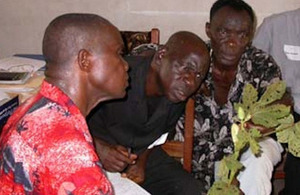DFID Research: Sierra Leone benefits from Global Plant Clinic initiative
The DFID-funded Global Plant Clinic has provided the Sierra Leone government with assistance in the fight against crop pests and diseases.

Diagnosis of a pest of okra at the Global Plant Clinic in Sierra Leone
Poor farmers across Sierra Leone now have better and more regular access to reliable advice on plant health problems, after a Global Plant Clinic (GPC) pilot project provided the Sierra Leone government with a way forward.
The Ministry of Agriculture, Fisheries and Food Security in Sierra Leone approved a proposal to open plant health clinics, based on the successful GPC model, in each of its 13 districts earlier this year. The project was awarded a grant of US$80,000 for the first year, and already seven clinics are up and running with more planned to open over the coming months.
The world’s poorest people rely on their crops for basic survival and for them pests and diseases are a constant threat. The Sierra Leone initiative is just one example of how the GPC is making a real and lasting impact on the lives of poor farmers. The GPC has helped to establish more than 80 plant health clinics in nine countries throughout Latin America, Africa and Asia, with pilot clinics in another 9 countries.
The plant doctors who staff the clinics advise farmers on plant health problems in the same way as medical doctors and vets. Consultations usually take place once a week in public places, such as markets or village meeting areas. Farmers bring along samples of their diseased crops for plant doctors to diagnose and prescribe safe, affordable and locally available solutions.
“There is no tradition of plant healthcare for smallholder farmers,” says Dr Eric Boa, Head of the GPC. “Farmers rely on help from NGOs, farmer associations and research and technology organisations but their support is poorly coordinated. Resources are poor but much can be achieved by running Plant health clinics.”
“The GPC and its many partners are filling a gap by giving thousands of farmers access to regular and reliable on-the-spot advice on any crop and its problems. The majority of clinic users have never have had such services before and they warmly welcome this innovation. Extension workers and researchers also welcome the opportunity to collaborate.”
As well as setting-up, training and supporting the development of plant healthcare systems, the GPC is actively involved in surveillance of crop diseases. The GPC’s main office, located at CABI in the UK, has an expert diagnostic service with an international reputation and can accept diseased plant samples from all countries. Samples received at the laboratory usually can’t be diagnosed in-country because the necessary expertise is lacking or absent.
The diagnostic service receives more than 500 samples each year from more than 80 countries. The GPC is closely involved in identifying new diseases and has published 31 new disease records with its global partners since 2001, 11 from Africa alone. Rothamsted Research and The Food and Environment Research Agency both play a strong role in providing diagnostic expertise that is hard to find and difficult to access for farmers and national plant protection organisations who need the most help.
The GPC, with funding provided by DFID, has been making an extraordinary contribution to developing a healthcare service for plants and its role continues to grow. “The job has expanded hugely over the last five years,” says Dr Boa. “Our scientific expertise and development experience has allowed us to move out of the lab and into the field. We work with many more grassroots organisations, encouraging them to run their own plant health clinics. But they can’t do this by themselves, and our role is also to advocate and build stronger links between clinics and other support services. There’s still much to do, but already we see independent initiatives that promise better services for more farmers in more places.”
More information
Read the GPC country report on R4D: Plant Health Clinics for Sierra Leone
See the project record for the Global Plant Clinic on R4D